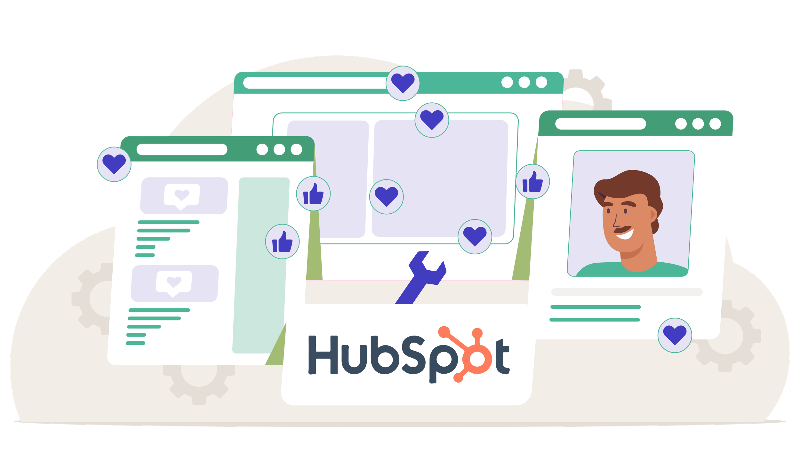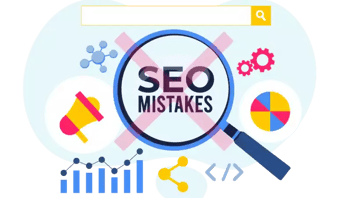Discover how HubSpot Marketing Hub can revolutionize social media marketing. Automate multi-channel postings and leverage AI to maximize engagement.
Maximizing SEO Benefits with Social Media. Boost Your Rankings
To make the most of social media for SEO, businesses must choose the right platform, create a clear social media plan, engage with their audience, and collaborate with social media influencers. By doing so, companies can establish a dominant online presence, skyrocket their search engine rankings, and attract more website visitors.
Social Media and SEO
To maximize the benefits of social media for SEO, it's essential to understand the basics of both social media and SEO. Social media refers to platforms allowing users to create and share content and interact with others. SEO, on the other hand, refers to the process of optimizing a website to rank higher on search engine results pages (SERPs).
The importance of social media for SEO lies in the fact that search engines view social media activity as an indication of a website's popularity and relevance. Social media interactions such as likes, shares, comments, and followers can influence a website's search engine ranking. For example, suppose a business has a strong social media presence with a high following and engagement rate. In that case, search engines will view the business as credible and authoritative, which can lead to higher search engine rankings.
In addition, social media provides an excellent platform for businesses to create and share valuable content. By creating and sharing engaging content, companies can attract more followers, increase engagement, and generate more website traffic. This, in turn, can improve their search engine rankings, as search engines view website traffic as an indicator of a website's relevance and popularity.
To optimize social media for SEO, it's essential to use keywords and hashtags in social media posts. This can help search engines identify the post's content and rank it accordingly. Businesses should also focus on creating high-quality content that is shareable and engages their audience. Engaging with followers by responding to comments and messages can also help improve a business's social media and SEO efforts.
The rise of social media has transformed the way we interact and access information daily. With millions of active users worldwide, social media platforms provide businesses an unparalleled opportunity to enhance their online presence and boost search engine rankings.
Choosing the Right Social Media Platform
Choosing the right social media platform is critical for businesses looking to maximize the benefits of social media for SEO. Not all social media platforms are created equal, and each has unique features and strengths. As such, here's what you should consider before choosing a social media platform for your content:
-
Audience demographics: Different social media platforms attract different demographics. For example, Instagram has a younger user base, while LinkedIn is popular among professionals. Businesses should choose a platform that aligns with their target audience.
-
Content format: Different social media platforms support different types of content. For example, Instagram is ideal for visual content, while Twitter is better suited for short-form text content. Businesses should choose a platform that aligns with the type of content they create.
-
Consider the platform's features: Different social media platforms have different features that can benefit your SEO efforts. For example, Twitter's real-time search feature can help businesses stay relevant and appear in search results.
-
Evaluate the competition: Analyzing your competitors' social media activity can give you insight into which platforms are most effective for your industry. It can also help you identify gaps in the market that you can exploit.
-
Test and refine: Finally, testing different social media platforms and refining your strategy based on your results is essential. This will help you determine which platforms are most effective for your business and optimize your social media and SEO efforts accordingly.
Some of the popular social media platforms that businesses can consider for SEO are:
-
Facebook: With over 2.8 billion monthly active users, Facebook is the largest social media platform. It's an excellent platform for businesses to reach a broad audience, engage with followers, and share valuable content.
-
Twitter: Twitter is a real-time platform with over 330 million monthly active users. It's an ideal platform for businesses to share news and updates, engage with customers, and monitor industry trends.
-
Instagram: Instagram is a visual platform with over 1 billion monthly active users. It's an ideal platform for businesses with a visual component, such as fashion, food, and travel. Instagram also offers features such as Instagram Stories and Reels, which can help companies to increase engagement and reach a wider audience.
-
LinkedIn: LinkedIn is a professional networking platform with over 740 million members. It's an excellent platform for B2B businesses to connect with other professionals, share valuable content, and establish thought leadership.
-
YouTube: With over 2 billion monthly active users, YouTube is the second-largest search engine after Google. It's an ideal platform for businesses to share video content, including product demos, tutorials, and webinars.
-
TikTok: TikTok, while only a few years old, is a popular social media platform with over 1 billion monthly active users. It's an ideal platform for businesses that want to target a younger demographic and create engaging video content. TikTok also offers features such as hashtags and challenges, which can help companies to increase their reach and engagement.
Creating a Social Media Strategy for SEO
Creating a social media strategy for SEO is crucial for businesses that want to maximize the benefits of social media.
The first step in creating a social media strategy is to set clear goals. These goals should be specific, measurable, and aligned with your business objectives. For example, your goals could be to increase website traffic, improve SEO for your website, or generate leads.
The next step is to identify your target audience and choose the right social media platforms, as discussed above. Once you know which platforms you'll work with, it's time to begin creating content.
Creating high-quality content is critical to social media success. Your content should be engaging, relevant, and valuable to your target audience. Don't forget personalization; make your content specific to your target audience and buyer personas. You should also optimize your content for SEO by using relevant keywords and including links to your website. It's essential to keep in mind that the content you produce should coordinate with the platforms you're using. For example, if you're promoting content on LinkedIn and Twitter, the content won't be precisely the same.
You Might Also Like This Post:
Your work isn't done even after you're live on social media. Social media is a two-way conversation. Engaging with your audience by responding to comments and messages, asking for feedback, and starting conversations is essential. This will help you build relationships with your followers and increase engagement.
Finally, analyzing your social media performance regularly and refining your strategy based on your results is essential. This will help you identify what works and what doesn't, optimize your efforts, and achieve your business goals.
Ultimately, creating a social media strategy for SEO is crucial for businesses that want to establish a solid SEO foundation and improve their search engine rankings. Following these steps and using suitable SEO tools, you can optimize your social media efforts and achieve your business objectives.
-
Choosing the right social media platforms
-
Creating high-quality content
-
Engaging with your audience
-
Analyzing and refining your strategy
It's time to start reaping those interactions and increase traffic and lead conversions. Good luck!
This content is also available in:
- German: Social Media für Top-SEO: Rankings steigern
- Spanish: Redes sociales para SEO: Aumente su posicionamiento
- French: Boostez votre SEO avec les médias sociaux
- Italian: Social Media e SEO: Strategie per Migliorare il Posizionamento Online
- Romanian: Maximizează-ți Clasamentul SEO cu Ajutorul Social Media
- Chinese: 利用社交媒体实现搜索引擎优化效益最大化。提升排名












Leave a Comment